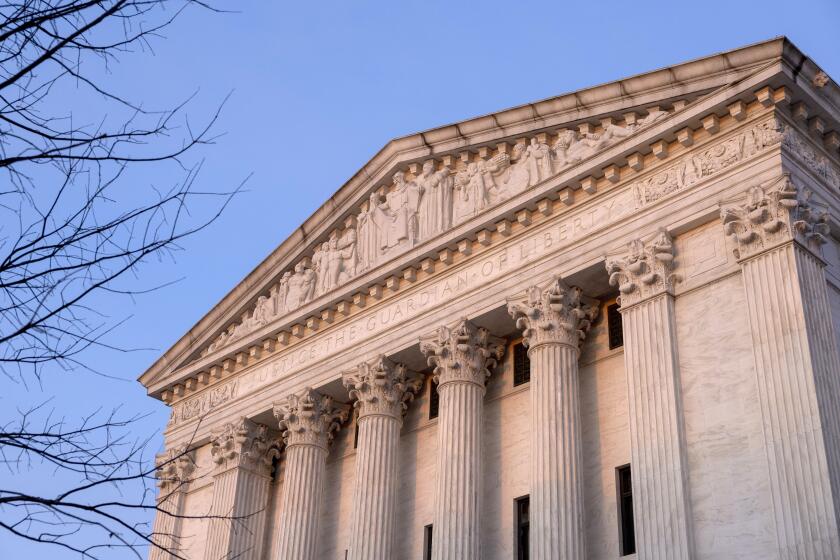Both Sides State Cases on Death Penalty Bill
After spending 24 years in prison for the murder of a Long Beach man, Thomas Goldstein was freed in 2004 when five federal judges ruled he had been wrongly convicted, largely on the word of an unreliable jailhouse informant.
However, if a bill set for a hearing in the Senate Judiciary Committee today had been in effect then, Goldstein would not have been able to establish that his constitutional rights had been violated by prosecutorial misconduct.
Goldstein, 56, now works as a paralegal. He has gone to Washington twice in an effort to defeat the Senate bill -- and companion legislation in the House -- which he says “would deny review of many death penalty cases by the federal courts.... If this law was in effect when I was going through the system, I would still be in prison.”
Mary Ann Hughes, whose son Christopher was killed 22 years ago in Chino Hills, also feels she has been abused by the government. But she says the proposed legislation is needed to remedy a legal system that is “grotesquely skewed” in favor of inmates appealing their sentences.
Last year, hours before Kevin Cooper was to be executed for murdering Hughes’ 11-year-old and three other people in 1983, a federal appeals court granted him a stay so that DNA testing could be conducted. The tests indicated Cooper’s guilt, and a federal judge denied all the claims in his habeas corpus petition. That ruling is now on appeal.
“I urge you to reform the ... system so the profound abuses and manipulations that have allowed the murderer of our son to evade justice for over 22 years will finally be brought to an end,” Hughes told a congressional subcommittee last week.
The Streamlined Procedures Act, say sponsors Rep. Dan Lungren (R-Gold River) and Sen. Jon Kyl (R-Ariz.), is needed to stop the “endless delays” between convictions and executions in capital cases. Bogus and repetitive claims by inmates, supporters of the measure argue, only serve to prolong the agony of murder victims’ families.
But the American Bar Assn., one of many groups opposing the legislation, says it would mandate “virtually unattainable procedural and other requirements to establish innocence. These requirements will prevent many innocent prisoners from reaching federal court.”
The Streamlined Procedures Act would dramatically curtail writs of habeas corpus, the method used by inmates to assert illegal imprisonment.
The Judicial Conference of the United States, several former federal judges and FBI directors, and conservatives such as former U.S. Rep. Bob Barr of Georgia have opposed the legislation, saying it could erode fundamental liberties.
“This is a very radical bill,” said Ruth E. Friedman, an appellate lawyer who has tried numerous capital cases in Alabama and has advised the Administrative Office of U.S. Courts in efforts to improve the quality of death penalty representation in the South.
“It proposes to gut years of Supreme Court case law, most of it by the Rehnquist court,” she told a House Judiciary subcommittee last week.
Forty-nine of the 50 state chief justices passed a resolution last summer opposing the legislation. California Chief Justice Ronald M. George led the effort, even though he is a death penalty proponent, because he said passage of the act would endanger fundamental fairness.
But its proponents have continued to press their case. In the Senate, Sen. Arlen Specter (R-Pa.) introduced an amended version of the bill, which he said cured some of the problems raised by the opposition.
However, opponents say that it retains many of the most egregious features and would continue to bar the door to many meritorious claims.
In order to enhance the prospects of changing the law, those backing the Streamlined Procedures Act have attached some of the most stringent provisions to several other bills, such as the Child Protection Act. That means it is possible there could be dramatic changes in habeas corpus without a full hearing on the issue.
On Tuesday, some critics expressed concern that the Republican leadership in Congress might use its muscle to include new limits on habeas petitions in legislation renewing the Patriot Act, which is intended to fight terrorism.
Portions of that law expire at year’s end, and Congress is expected to act before Thanksgiving.
Democrats asserted Tuesday that they were being cut out of negotiations to reconcile Senate and House versions of the renewal bills, a charge Republicans denied.
*
Times staff writer Richard B. Schmitt in Washington contributed to this report.
More to Read
Get the L.A. Times Politics newsletter
Deeply reported insights into legislation, politics and policy from Sacramento, Washington and beyond. In your inbox three times per week.
You may occasionally receive promotional content from the Los Angeles Times.






